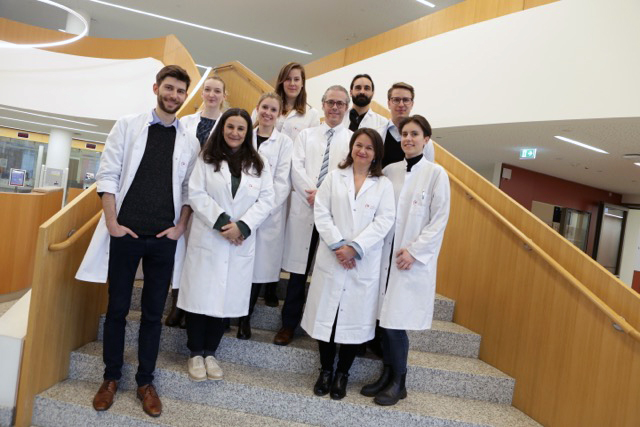
The world is going through unprecedented times as the SARS-CoV-2 virus causing COVID-19 is affecting most of the countries. In March, the Research Luxembourg COVID-19 Task Force has been set up in order to offer to the health system the combined expertise available within the Luxembourg public research sector. Under the coordination of the Ministry of Higher Education and Research, the Luxembourg Institute of Health, the Luxembourg Institute for Socio-Economic Research, the Luxembourg Institute of Science and Technology, Luxinnovation, the University of Luxembourg et le the National Research Fund (FNR) are currently involved in various research projects focusing on the current epidemic.
The NCER-PD team is heavily involved in this fight against the virus, either by participating in this COVID-19 Task Force or by helping as healthcare professionals in hospitals and “maisons médicales” (medical centres).
Cross-sectional study on infection prevalence in Luxembourg (CON-VINCE)
The ‘COvid-19 National survey for assessing VIral spread by Non-affected CarriErs’ - CON-VINCE for short - is one of the projects of the task force and involves some of the NCER-PD team members.
The aim of this study is to evaluate the dynamics of the spread of the virus within the Luxembourgish population. Asymptomatic individuals and mildly symptomatic carriers play a significant role in the spread of the virus. However, they currently remain largely unassessed, since diagnostic testing is performed mostly on people with clear symptoms. During the CON-VINCE study, 1,500 people will be tested for the presence of the SARS-CoV-2 virus and only the asymptomatic and mildly symptomatic individuals will be followed-up.
“To the best of our knowledge, asymptomatic carriers are not systematically monitored in any of the countries affected by the COVID-19 pandemic. Therefore, at present, no comprehensive data on the epidemiology and dynamics of the disease exist. CON-VINCE aims to fill this gap by providing reliable information on the nature, prevalence and transmission modality of COVID-19 in the Grand Duchy, therefore guiding national and international decision-makers in mounting an effective public health, political and economic response to the pandemic”, explains Prof Rejko Krüger, coordinator of the Luxembourg Parkinson Study and currently coordinator of the CON-VINCE study.
Several NCER-PD team members will be working on various stages of this study. The clinical team will for example help with recruitment as well as sample collection, storage and processing. The bioinformaticians who usually work for NCER-PD will take care of data integration and storage. They will make good use of the IT infrastructure they developed for the Luxembourg Parkinson’s Study to record information about the coronavirus patients who have been diagnosed in the country. This set up will allow fast access to standardised data.
Hands-on help in the hospitals and maisons médicales
Part of the clinical team is also actively helping in the hospitals and “maisons médicales” in Luxembourg. For example, neurologists in training Dr Lara Stute and D. Sylvia Binck are currently working at the Centre Hospitalier de Luxembourg. They assist in the COVID-19 suspicion ward, where patients with signs of respiratory diseases are placed while waiting for their test results (PCR-based virus test* and/or a CT scan).
Research nurses like Anne-Marie Hanff have also been highly involved since the month of March. She is currently volunteering several times per week at the LUXEXPO event hall in Kirchberg, which has been temporarily converted into a “maison médicale”. As a nurse, she is involved in triage, which means screening the patients for symptoms and allocating them to the appropriate care pathway (corona-specific or general pathway). “When we welcome the patients, it is important to explain to them the process and to get a quick overview of their general condition and to assess the urgency of the situation,” explains Anne-Marie Hanff. “We have to evaluate together with the doctors which patients require priority care and are most likely to be hospitalised and which are not.”
On top of screening the patients, it is also important to pay particular attention to the provision of food, medication and hygiene products at home, especially for older patients. Many patients are being anxious about the pandemic situation and need psychological help as well. “If possible, I try to arrange suitable offers of help,” says Mrs. Hanff. “Since I am the president of the Luxembourgish professional association of nurses (ANIL), I felt I had a huge responsibility. I was keen to play my part in this fight against the virus and was therefore very grateful when Prof. Rejko Krüger and the Luxembourg Institute of Health agreed to do so. Being able to help where help is needed feels right and important,” emphasises Anne-Marie Hanff.
* The genetic test used to find out if somebody has a COVID-19. A swab from the mucous in your nose and throat is taken and analyse for the presence of viral genetic material.
Read more:
Photo: © scienceRelations




